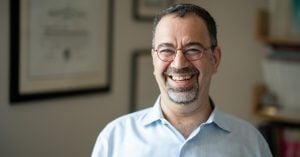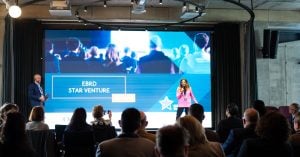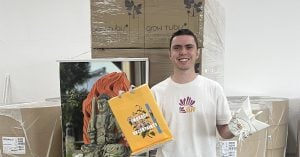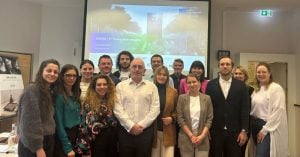“Coffee is the number one beverage in the world, it’s a stock exchange product, and therefore very present in the minds of consumers. We believe that if we focus on increasing the sustainability of the coffee value chain, we can bring to public attention the sustainability aspect of consumption and production,” Dr.-Ing Alexis Pantziaros, co-founder of Coffe-Eco tells The Recursive.
Educating consumers, as well as potential partners, around the benefits of creating a circular espresso supply chain, is key to the go-to-market strategy of Coffe-Eco, a startup that upcycles coffee waste into high-value added products mainly for the food and cosmetics sector.
The idea behind the startup was born during Alexis’ PhD research. Originally from Cyprus, Alexis moved to Greece 10 years ago to study chemical engineering. The entrepreneurial family roots inspired him to further realize the synergies between his PhD journey and bringing a product to market. “Sustainability must be applied to have meaning,” he added.
The market timing is great, with interest in food byproducts as raw materials for cosmetic products rising around the world. The trend has been accelerated by the disruption in supply chains for natural ingredients for the cosmetic companies. In the UK, for instance, Upcircle Beauty upcycles waste materials into skin care products. Southeast Europe is well-positioned to benefit from this trend, Alexis believes. Having top and fast-growing agriculture sectors among European countries, SEE can benefit from producing a lot of the raw material.
The Recursive talked to Dr.-Ing Alexis Pantziaros to learn more about their ambitions, business model, and next plans.
The Recursive: What environmental impact are you aiming to generate with Coffe-Eco?
Dr.-Ing Alexis Pantziaros: Humanity produces 18 million kg of wet spent coffee ground annually; this is the equivalent of 2 million kilograms of CO2 emissions. In turn, we need 95 million trees to capture that quantity of emissions. Imagine that if we managed to upcycle 100% of this waste, we could leave 95 million trees to capture CO2 emissions from other sources.
We plan to upcycle 100 tons of coffee grounds waste per year, which means freeing 600 trees to capture CO2 emissions from other sources.
What are the technology innovations behind Coffe-Eco?
The main goal of Coffee-Eco is to transform the espresso supply chain from linear to circular. In the first phase, we collect coffee grounds from businesses. The first part of innovation is the extraction process. During my PhD in Chemical Engineering from the University of Patras, together with my colleague and co-founder Marios Vlachogiannis, we developed an extraction process that can extract some substances helpful in making food and cosmetic products more healthy.
This process currently leaves some waste. So, we are now testing new approaches to transform this waste into alternative material for the furniture industry. The product is not yet commercial, as it is costly on a small scale.
Finally, we are developing another product together with an external partner, this is also at a very early testing stage, but the goal is to produce raw material for bio-plastic products.
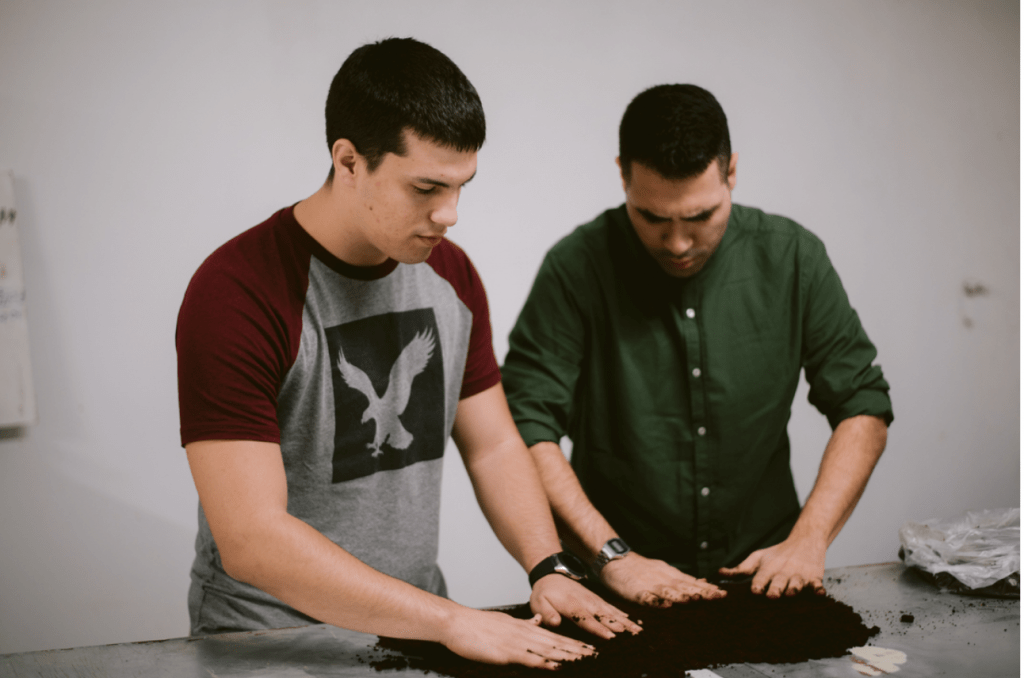
What challenges have you faced so far and how are you overcoming them?
From 2016, when the idea of Coffee-Eco was born, we faced two main challenges. Because the concept stems from my PhD research, it wasn’t easy to transform the investigation into a viable product. And not because there is no business value behind the study, but because the business world cannot agree on what value is. So, we faced the challenge of convincing businesses that something developed by a university could be helpful for them.
We ran into a second challenge, moving forward and collecting coffee waste from key B2B waste generators such as coffee producers and coffee shops. They could not understand the value of coffee waste and what the process was bringing them.
We started by telling coffee shop owners that we would manage the entire waste collection process ourselves. In the beginning, they were asking for some benefit in return, which was an external cost for our business model we could not incur. We had to adapt and find a solution in changing our target market to big franchise companies with whom we could sign partnership agreements. We found more alignment because more prominent companies have waste management programs and targets that we can contribute to. Through these partnerships, we end up collecting from the mother company and all its franchisees.
When it comes to waste management, we must understand that if we want to move towards sustainability, we need to talk about big volumes. It’s good to collect kilograms of waste, but we need to go big to develop an impactful and profitable upcycling company. And for that, we need to partner with big waste producers.
As a startup that needs to think big from the get-go, how did it go so far with managing this need to scale fast?
It wasn’t easy. The pandemic was a challenging time to manage financially but also product-wise. For the last four years, we have been working 18 to 20 hours per day.
We finalized our product in the last two months. It was a very intense process. We are taking coffee grounds waste and transforming it into ingredients that food and cosmetic companies can use in their products. So, the formula of production was precise. We have been going through an intense testing process, sending samples to interested companies and implementing their feedback.
It was also a zero cash flow period for us. We managed to sustain the company from awards at startup programs and competitions. This is a point that I want to get across with entrepreneurs. It’s essential to participate in such programs in the early days of the startup.
Now, we are raising capital, and we have some potential clients interested in our product.
What would you advise entrepreneurs bringing their sustainability solutions to the market?
Get feedback from the market, from the customer. It can be through cold calling, LinkedIn, email – you name it. The number one needle mover in this world is to apply customer feedback to the product. It isn’t easy to understand the commercial value of any sustainable development initiative, and the only one who can tell you immediately if it has potential use is your end customer. I think it’s the number one way to move forward to get to market and increase profitability.



